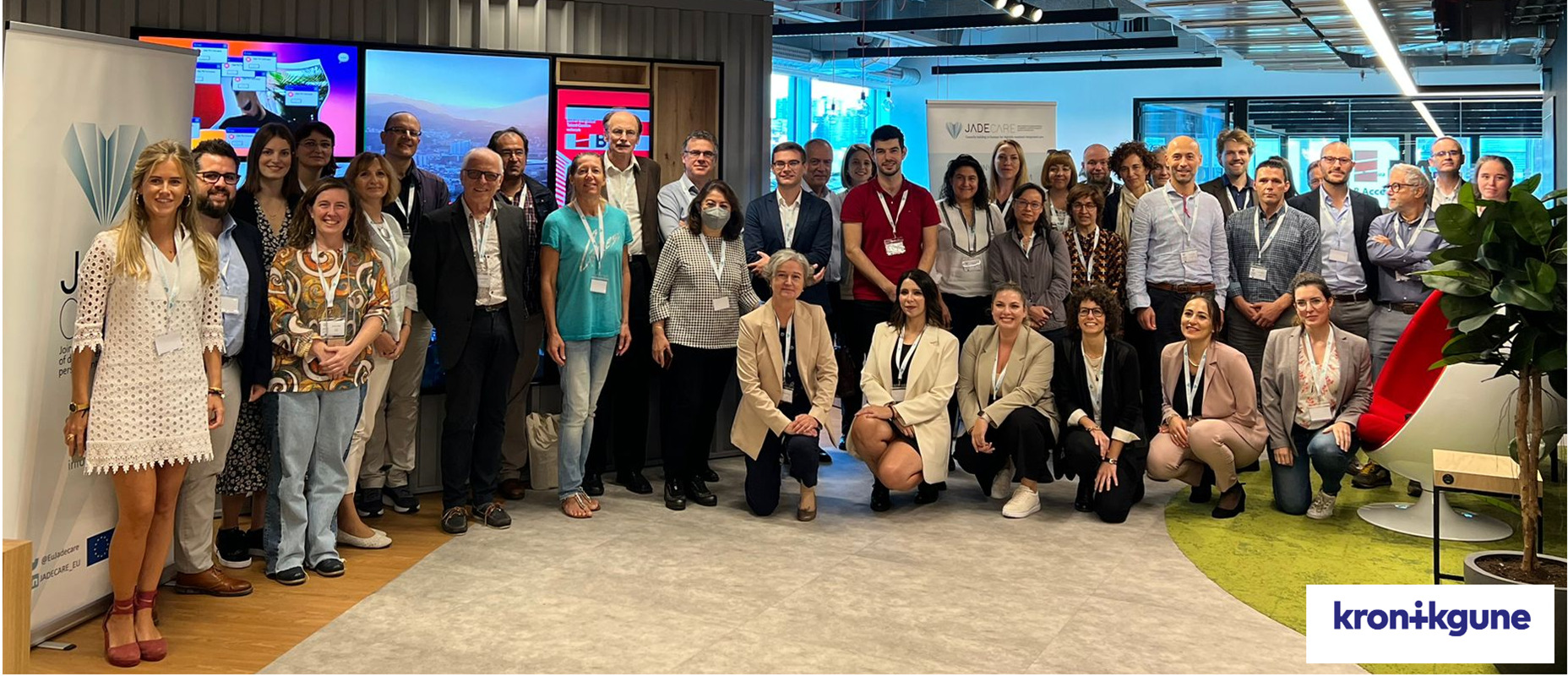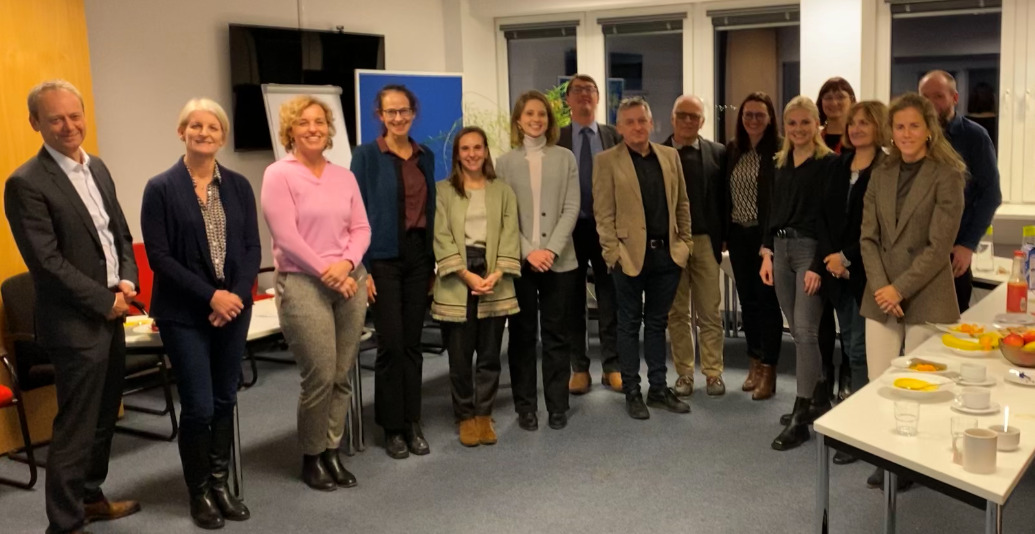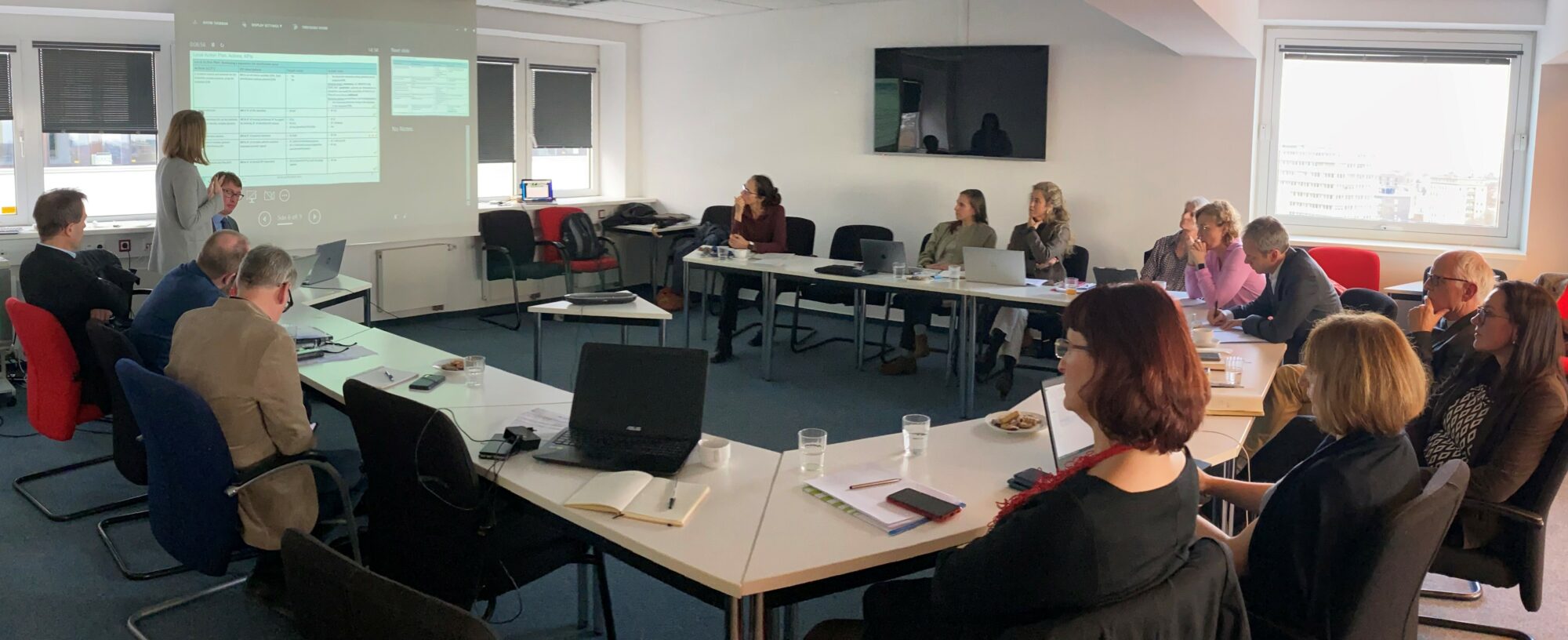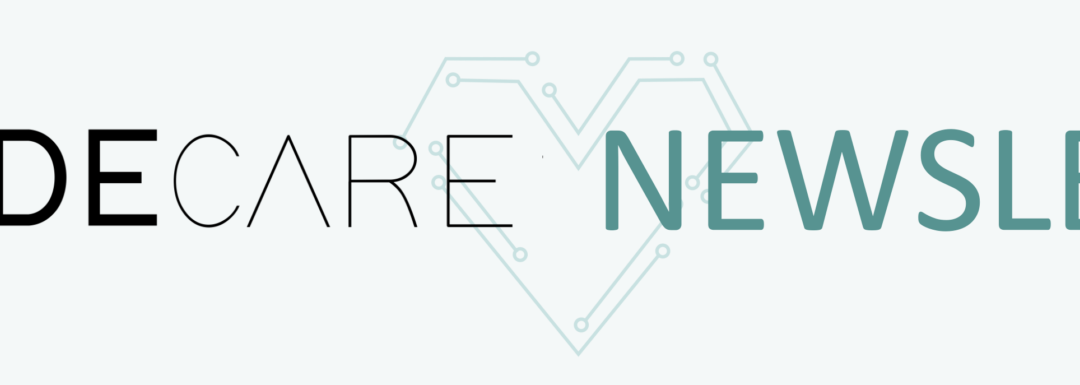Focus Article: 2nd Consortium Meeting of JADECARE on 26-27 October 2022, Bilbao – Spain
The aim of the EU funded Joint Action JADECARE is to reinforce the capacity of health authorities and address the health system transition to digitally enabled integrated person-centred care, by supporting the best practice transfer from the systems of the 4 original Good Practices (oGPs)
- Basque health strategy on ageing and chronicity: Integrated care (Basque Country, Spain) [WP5]
- Catalan Center for Open Innovation on ICT-supported integrated care services for chronic patients (Catalonia, Spain) [ WP6]
- The OptiMedis model – integrated population-based care (Germany) WP7]
- Digital roadmap to an integrated health care sector (Southern Denmark Region) [ WP8]
to 21 Next Adopters (NAs)
The 2nd Consortium Meeting was organised with the aim to share the progress of the project and highlight the main activities carried out in the last year, presenting the milestones and results that have been achieved, and finally defining next actions to be carried out in the coming months.

The Institute for health Services Research Kronikgune, the Coordinator of the Joint Action (JA)[1] and lead of the Basque good practice hosted the two days’ hybrid event where many project partners had the opportunity to meet their colleagues face to face. The event brought together more than 50 attendees face-to-face ranging from directors of competent authorities, health ministries to technical researchers from 45 organizations of 16 European countries, who met in the Bizkaia International Centre for Entrepreneurship, located in the Bizkaia Tower, in Bilbao. Another 50 partners of the consortium of JADECARE could also attend the meeting online.
Esteban de Manuel Keenoy, the project coordinator, welcomed every participant and highlighted the good and intense work accomplished by all the partners of the Consortium in spite of the obstacles that COVID19 has caused.
The meeting started with an overview of the relevant policy priorities of DG SANTE presented by Loukianos Gatzoulis, from the Unit ‘State of Health, European Semester, Health Technology Assessment.
An update of the current situation of the Joint Action was given by Jon Txarramendieta, project manager of JADECARE at Kronikgune, who presented the progress of the second year of the Joint Action.
The rest of the first day was devoted to the 21 Next Adopters of the four oGPs who presented their context and local good practices and gave an overview of the preliminary results of their implementation processes together with the main deviations encountered and mitigation actions designed.
Work Package (WP)5 Next Adopters have achieved 53% of their implementation progress and fully achieved 52% of the Key Performance Indicators defined. The WP5 NAs work, among other topics, on a national approach for population risk stratification, together with a proposal to risk adjusted financing and commissioning, or a model of taking care for complex patients that is workable and sustainable by identifying, selecting and enrolling complex patients and identifying professionals for building multidisciplinary teams.
Among the four Next Adopters of WP6, they have selected different combinations of the Catalan oGP to transfer: (i) health risk assessment, (ii) promotion of healthy lifestyles, (iii) vertical-horizontal integration experiences, (iv) innovative assessment & regulatory issues, (v) digital support to integrated care. The transfer of Risk stratification core features (CFs) has shown high potential for achieving sustainable adoption. The NAs transferring elements of all five blocks have proven to gain deep knowledge on current challenges and potential solutions and will further consolidate specific plans for transferability including a piloting experience.
The achievements of the WP7 Next Adopters range from the review of existing data, detection and analysis of gaps and development of data dashboard, to the development of contracting and payment framework for integrated services, or the development/fostering of collaboration with healthcare providers and preventive care.
The eight Next Adopters of WP8 in general have found JADECARE as a catalyst for moving different local good practices in the right directions and for taking the next step in achieving a more integrated healthcare service. Generally, good progress has been achieved with successful study visits, thematic workshops and the meetings in between. However, the NAs found some bottlenecks as a lot of them chose CFs that have proved to be dependent on cooperation from other entities and authorities – both local and national- and this has been a complex landscape for them to navigate.
Four of the 21 Next Adopters of JADECARE have adopted a mix and match approach, meaning a transfer of CFs of various oGPs. Their key learnings are so far that even if the transfer approach was not simple and they found some difficulties with the process of merging the different CFs, everyone is at the end satisfied with how it worked. Moreover, they have found no barriers from an organizational point of view and they consider that the COVID19 has had a double influence.
The second day of the Consortium Meeting focused on presenting the status and main achievements of horizontal WPs; WP1 Coordination and management, WP2 Communication and dissemination; WP3 Evaluation, and WP4 Integration in National Policies and Sustainability.
Moreover, some specific content of each WP and their next steps were presented. During the last year of the Joint Action WP1 (Coordination and Management) will focus on fostering the publication of scientific articles along with the general management of the Joint Action, the preparation of the Final periodic report and the organization of the 3rd Consortium Meeting aligned with the Final Conference.
During the second year WP2 (Communication and dissemination) has worked on creating transparency and visibility of project results. During the last year WP2 will strengthen the audience- & partner engagement on the social channels, produce and disseminate newsletters, further feed the JADECARE webpage and will organize the third Stakeholder Forum aligned with the Final Conference, as well as promote the participation in local/regional and national events to increase the visibility of JADECARE.
JADECARE Evaluation approach was developed by WP3 (Evaluation) during this second year of the project. It included the definition of a total of 88 indicators to measure, the project progress monitoring, the quality assurance of implementation and the impact evaluation. During the last year of the Joint Action WP3 will work on the Evaluation approach by collecting all applicable indicators, conducting surveys and analysing all the data gathered.
Moreover, during the Consortium Meeting, Ane Fullaondo (Kronikgune), Scientific coordinator of the JA, presented the methodology for the Post-implementation phase of JADECARE to be conducted from January to September 2023, that will include the analysis of the implementation results, the reporting of the implementation and the analysis of the implementation process.
WP4 (Integration in National Policies and Sustainability) has worked during this second year on the organization and reporting of the 10 Thematic workshops together with the NAs and the oGP leaders, which were conducted between June and July 2022. Key learnings from the workshops were the importance of understanding the context and build on existing projects; to involve and empower members of all health services and patients, to improve communication on finding and also to define outcome and performance indicators based on value-based care principles, as well as to mobilize needed data sources and strengthen analytical work.
Additionally, Jelka Zaletel and Denis Opresnik, (NIJZ) presented the sustainability strategy and sustainability action plan of JADECARE and Zdenek Gutter presented the Czech case for building sustainability of the JADECARE practice, including the presentation of the policy frameworks and the holders of sustainability within the Czech Republic.
All participants agreed that the presented results of the previous year were very promising and satisfactory, and the Consortium meeting provided a great opportunity to discuss plans, implementation, and sustainability for the next year ahead.
Video on the event:
https://www.youtube.com/watch?v=ZN-SvGkMB3g&t=8s
Got newsletter forwarded? Click here for subscribing for your own copy
Focus Article: JADECAREs 2nd Stakeholder Forum 23 November 2022 in Hamburg – Germany
More than 75 participants from over 50 different European organisations joined the 2nd Stakeholder Forum online and onsite in Hamburg. Kai Schnackenberg and Lena Schulze of the Ministry of Labour, Health, Social, Family Affairs and Integration (BAGSFI), Hamburg, Germany, and Dr. Martina Rimmele of the Bavarian Health and Food Safety Authority (LGL), Bavaria, Germany, welcomed the participants.
 The audience enjoyed an exquisite keynote on “Prerequisites for person-centred digital health applications to support integrated care” from Prof. Viktoria Stein, Assistant Professor for Population Health Management at Leiden University Medical Centre, Netherlands. She reminded the audience that digital health can be regarded as the grease (to smoothen transitions) and the glue (as a transformative force) for integrated care and that digital health literacy is an important social determinant of health. She demonstrated that in most person-centred projects, the codesign process with the patients themselves is still rarely applied.
The audience enjoyed an exquisite keynote on “Prerequisites for person-centred digital health applications to support integrated care” from Prof. Viktoria Stein, Assistant Professor for Population Health Management at Leiden University Medical Centre, Netherlands. She reminded the audience that digital health can be regarded as the grease (to smoothen transitions) and the glue (as a transformative force) for integrated care and that digital health literacy is an important social determinant of health. She demonstrated that in most person-centred projects, the codesign process with the patients themselves is still rarely applied.
An overview of the JADECARE status of implementations, achievements, as well as learnings, presented by Dr. Ane Fullaondo, Scientific coordinator of Kronikgune Institute for Health Services Research, Spain, included the learnings:
- a value-based and thorough definition of performance indicators is important, as is
- ongoing and constant communication and networking within the Next Adopter (NA) working groups and transfer work packages and
- continuous learning from successes and failures is key.
Five Next Adopters shared their hands-on experience, their local Good Practices and learnings in the implementation in their local contexts. In their presentations the NAs could showcase that digital tools and programs could support healthcare workforce and authorities in healthcare improvement.
In addition to these hands-on insights and learnings of JADECARE implementers, relevant and useful reflections and suggestions were exchanged between the audience and seven renowned high level healthcare experts:
Donna Henderson, Head of International Engagement and Digital Healthcare Innovation at Technology Enabled Care (TEC), Scotland, Marc Lange, General Secretary of EHTEL, Ulrik Appel, Project Manager of Steno Diabetes Center of North Denmark, Prof. Miklós Szócska, Dean of the Health Service Faculty at Semmelweis University, Hungary, Prof. Dipak Kalra, President of the European Institute for Innovation through Health Data (i-HD), United Kingdom, Lars Hulbaek, CEO of MedCom, Denmark and Angeles Barrios, Public Affairs and Stakeholder Relations Lead of European Institute of Innovation and Technology (EIT) Health, Spain

Topics discussed with the experts included “Stakeholders needs and involvement to make digital solutions, supporting integrated patient-centred care, a reality in their systems” and “Ways to integrate health and social care services and how they can be supported by digital solutions”.
The experts pointed out that stakeholders need an alignment of policies and their priorities in order to efficiently use digital health solutions. They raised the European Policy’s commitment to the societal change towards digital health with the European Health Data Space (EHDS) Article 3 „Rights of natural persons in relation to the primary use of their personal electronic health data“ and the newly released “Declaration on Digital Rights for citizens“.
They also highlighted the challenges for Stakeholders in chronic disease prevention on different levels: local Stakeholders (e.g. municipalities), national Stakeholders (e.g. ministries of health) and European Stakeholders (e.g. the JADECARE consortium).
The experts pointed out that the challenge, also in JADECARE, is to move from pilots to sustainable options, keeping a look on a larger circle of Stakeholders and at budgetary vs. workload rectifications and not only on micro-scale. They described that e-Health portals in which citizens and health care professionals can look up the records from hospitals should contain also current relevant diagnoses from general practitioners (GPs), which are holistic and are thus useful also for social services for an efficient integration of health and social care. The challenge is to identify what data would be relevant for social services, for GPs and for hospitals.
The experts expressed that Health and social care integration is a must and that urgent challenges regarding health data are
- Gathering of hospital data, but also primary care data of GPs and even more so of social care data
- Interoperability of data to unlock the full potential of data by connecting care levels
- Data protection without blocking the possibility to use them for health and social care improvement
- Use and sharing of primary and secondary health data, enabling innovation purposes.
The experts acknowledged the achievements of JADECARE and recommended to lead the experiences and Good Practice transfer of JADECARE into a permanent JADECARE clearing house that supports the systems capability transformation of health systems.
Got newsletter forwarded? Click here for subscribing for your own copy
JADECARE Newsletter Subscription:
Load content below to proceed
Click on the button to load the content from 8f23b36d.sibforms.com.
